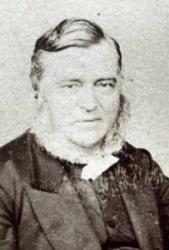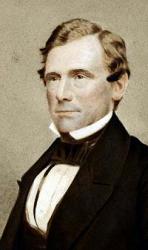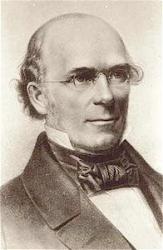Planning worship?
Check out our sister site, ZeteoSearch.org,
for 20+ additional resources related to your search.
- |
User Links
Person Results
‹ Return to hymnal



Export as CSV
John T. Grimley
Person Name: J. T. Grimley Hymnal Number: 374 Composer of "WOODSIDE" in The New Baptist Praise Book
John T. Grimley
Mrs. T. D. Crewdson
1808 - 1863 Person Name: Jane Crewdson Hymnal Number: 202 Author of "There's not a grief, however light" in The New Baptist Praise Book Crewdson, Jane, née Fox, daughter of George Fox, of Perraw, Cornwall, was born at Perraw, October, 1809; married to Thomas Crewdson, of Manchester, 1836; and died at Summerlands, near Manchester, Sept. 14, 1863. During a long illness Mrs. Crewdson composed her works published as:—
(1) Lays of the Reformation, 1860. (2) A Little While, and Other Poems (posthumous), 1864. (3) The Singer of Eisenach, n.d.; and (4) Aunt Jane's Verses for Children, 1851. 2nd ed. 1855, 3rd 1871.
From these works nearly a dozen of her hymns have come into common use. The best known are, "O for the peace which floweth as a river," and "There is no sorrow, Lord, too light." In addition to these and others which are annotated under their respective first lines, there are the following in various collections:
1. Give to the Lord thy heart. 1864. Offertory.
2. How tenderly Thy hand is laid . 1864. Resignation.
3. Looking unto Jesus. 1864. Jesus All in All.
4. Lord, we know that Thou art near us. 1864. Resignation.
5. 0 Saviour, I have naught to plead. 1864. During Sickness. These plaintive lines were written a short time before her death.
6. 0 Thou whose bounty fills my cup. 1860. Peace.
7. The followers of the Son of God. 1864. The Daily Cross.
8. Though gloom may veil our troubled skies. 1864. Resignation.
--John Julian, Dictionary of Hymnology (1907)
======================
Crewdson, Jane, p. 268, ii. The following additional hymns by Mrs. Crewdson have recently come into common use through The Baptist Church Hymnal, 1900:—
1. For the sunshine and the rain. Harvest.
2. O Fount of grace that runneth o'er. Public Worship.
3. There is an unsearchable joy. Joy in God.
4. When I come with troubled heart. Prayer.
These hymns are all from her A Little While, and Other Poems, 1864.
--John Julian, Dictionary of Hymnology, New Supplement (1907)
===================
Crewdson, Jane, née Fox, p. 269, i. From her A Little While, and Other Poems, 1864, are:—
1. I've found a joy in sorrow. Power of Faith.
2. One touch from Thee, the Healer of diseases. Christ the Healer.
3. Tis not the Cross I have to bear. Faith desired .
--John Julian, Dictionary of Hymnology, Appendix, Part II (1907)
Mrs. T. D. Crewdson
John Eustace Giles

1805 - 1875 Person Name: John E. Giles Hymnal Number: 408 Author of "Thou hast said, exalted Jesus" in The New Baptist Praise Book Giles, John Eustace, was born at Dartmouth in 1805, and educated for the ministry at the Baptist College, Bristol. After preaching for a short time at Haverfordwest, he became, in 1830, pastor of the church in Salter's Hall, London. Leaving Baiter's Hall in 1836, he ministered successively at Leeds, Bristol, Sheffield, Bathmines (Dublin), and Clapham Common, London. He died at Clapham Common, June 24, 1875. His prose works include A Funeral Sermon on the Death of Robert Hall; Lectures on Socialism, &c. From childhood he composed hymns and poetical pieces. In 1834, at the request of the Baptist Missionary Committee, he composed a hymn in celebration of Negro emancipation,
and Nos. 9,16, & 24 in their Jubilee Collection, 1842.
The hymn by which he is best known is:—
Hast Thou said, exalted Jesus? Holy Baptism (Adult). It is a composition of special merit, and in English Baptist congregations is probably oftener sung on Baptismal occasions than any other hymn. It was written "during a serious illness, in 1830, and in anticipation of having to baptize several persons at Salter's Hall, London, on his recovery." (Singers and Songs, 1869, p. 482.) It was printed in 1830 in 6 stanzas of 6 lines. In 1858 it was given in the Baptist Psalms & Hymns, No. 705, with the omission of st. ii. The full original text is in the Baptist Hymnal, 1879, No. 639. It is also in several other collections. [Rev. W. R. Stevenson, M.A.]
-- John Julian, Dictionary of Hymnology (1907)
John Eustace Giles
Emily Anne Eliza Shirreff
1814 - 1897 Person Name: E. L. Shirreff Hymnal Number: 456 Author of "Gracious Saviour, Who didst honor" in The New Baptist Praise Book
Emily Anne Eliza Shirreff
John G. Adams

1810 - 1887 Hymnal Number: 319 Author of "Heaven is here, where hymns of gladness" in The New Baptist Praise Book Adams, John Greenleaf. Co-editor with Dr. E. H. Chapin of the Universalist Hymns for Christian Devotion, 1846; and, alone, of the Gospel Psalmist, 1861. He was born in Portsmouth, New Hampshire, 1810. The collections named contain in each case 16 hymns by him. They are not, however, received outside his sect. The best are:—
1. Heaven is here, its hymns of gladness. [Peace.] Contributed to the Hymns for Christian Devotion, 1846, No. 419, in 4 stanzas of 4 lines.
2. God's angels! not only on high do they sing. [Ministry of Angels.] No. 830 in his Gospel Psalmist, 1861, and No. 240 in Longfellow and Johnson's Hymns of the Spirit, Boston, 1864. [Rev. F. M. Bird, M.A.]
--John Julian, Dictionary of Hymnology, (1907)
John G. Adams
Mrs. S. K. Bourne
1843 - 1908 Person Name: Susan Ketcham Bourne Hymnal Number: 384 Author of "Loud let the anthem ring" in The New Baptist Praise Book Susan Ketchum Bourne was the widow of the Rev. Shearjashub Bourne. She was largely identified with church and missionary work in the Congregational church of Manhattan, and was an active and charter member of Sorosis. She was perhaps best known to old New Yorkers as the chief founder and President of the Lydia F. Wadleigh Association.
© The Cyber Hymnal™ (www.hymntime.com/tch)
Mrs. S. K. Bourne
Theodore Parker

1810 - 1860 Person Name: Rev. Theodore Parker Hymnal Number: 156 Author of "O Thou great Friend to all the sons of men" in The New Baptist Praise Book Parker, Theodore, M.A., was born at Lexington, Massachusetts, Aug. 24, 1810; laboured with his father as a farmer and mechanic; entered Harvard College in 1830, but continued his work at home and attended the College for examinations; attended the Divinity School from 1834 to 1836, and became pastor of the Unitarian congregation in West Roxbury, June 21, 1837. He received the degree of M.A. from his College in 1840. Changes in his theological views led him to undertake the pastorate of a congregation in Boston, in January 1846. He continued his writing, preaching, and lecturing till 1859, when bleeding at the lungs compelled him to seek relief in Europe. He died at Florence, May 10, 1860. His publications were numerous, and have been republished in Great Britain. An extended list is given, together with 12 poetic pieces, in Putnam's Singers and Songs of the Liberal Faith, Boston, U. S. A., 1875. His life has been published by Weiss, and by Frothingham. A few of his poetical pieces are given in American Unitarian hymn-books.
These include :—
1. In darker days and nights of storm. Almighty Love. "Introduced in a sermon which Mr. Parker preached, entitled ‘The Practical Effects of the Ecclesiastical Conception of God.’”
2. 0 Thou great Friend of all the sons of men. Jesus the Way, the Truth, and the Life. This in the original is a sonnet. Altered for use as a hymn, it is widely used by American Unitarian; and is also given in some English hymnbooks.
-- John Julian, Dictionary of Hymnology (1907)
Theodore Parker
George F. Vincent
Hymnal Number: 160 Composer of "SUPPLICATION" in The New Baptist Praise Book
George F. Vincent
Frederick George Scott
1861 - 1944 Person Name: Rev. Frederick G. Scott Hymnal Number: 227 Author of "Cast thy care on Jesus" in The New Baptist Praise Book Scott, Frederick George. (Montreal, Quebec, April 7, 1861--January 19, 1944, Quebec City). Anglican. Bishop's University (Lennoxville, Que.), B.A., 1881; M.A., 1884; D.C.I., 1901. Pastorates (all in Quebec) at Montreal, 1884-1886; Drummondville, 1887-1896; Quebec, 1896-1933. During his time as Canadian Army chaplain on the Western Front (1914-1919), he formed close ties with thousands of soldiers, whose subsequent dispersal all across Canada ensured a warm reception for his writings, and his message. He published ten volumes of verse, a novel, and The Great War as I Saw It, which was widely influential.
--Hugh D. McKellar, DNAH Archives
Frederick George Scott


 My Starred Hymns
My Starred Hymns


